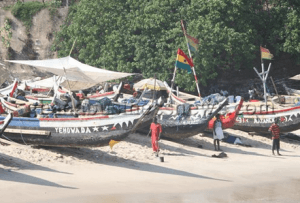Artisanal fishers blame dwindling fish stock on climate change
 Kobina Atta has been fishing in Sekondi on the western coast of Ghana since age 20. Now at 51, he complains about the changes in the seasons, rise in sea level, and dwindling stock of fishes, having a toll on his livelihood.
Kobina Atta has been fishing in Sekondi on the western coast of Ghana since age 20. Now at 51, he complains about the changes in the seasons, rise in sea level, and dwindling stock of fishes, having a toll on his livelihood.
“These days, the seasons have changed, we cannot differentiate between the Harmattan and the rainy seasons. It can rain today and in the next minute, the sun will be blazing. This really disrupts our activities,” he said.
This, he believes, has brought in its wake an increasing decline in fish stock and catch as fishing boats often returned from sea almost empty.
Atta, like many other artisanal fishers, has a strong conviction that changes in the climate is one of the driving forces behind the phenomenon.
Ghana’s fisheries sector
According to the Ministry of Food and Agriculture there are more than two million people in Ghana, or around 10 per cent of the population, who rely directly on fishing and related activities for their livelihoods.
A report published by the Environmental Justice Foundation (EJF) in 2018 said Ghana accounts for about 11 per cent of the total artisanal canoes in West Africa with small-scale fishing employing around 80 per cent of all fishers in the country.
The EJF said widespread illegal, unreported and unregulated (IUU) fishing and destructive practices such as the use of dynamite, monofilament nets, DDT, and light, continually cause irreplaceable damage to marine ecosystems.
The impact of climate change
In Ghana, ocean warming and acidification, arguably the two most dramatic effects of climate change on oceanographic conditions, are already wreaking havoc on those who make their living from the sea.
This is coupled with widespread IUU fishing, which spans from indiscriminate use of chemicals and explosives by canoe fishermen to increasing light fishing by both small-scale and tuna vessels.
Most fishermen complain that surface water fishes appear to be disappearing with reduction in the sizes of the fishes, attributing it to the changes in the marine environment.
The rise in sea levels has also resulted in coastal erosion, high tides in recent times, tidal waves affecting fishers, and storms making fishers unable to go for fishing expeditions as they wished.
“Nowadays we have noticed some changes in the sea. We have realised that the seawater has become warmer than it used to be,” said Atta.
Another fisherman, Samuel Tetteh, who has been fishing since age 15, said: “These days the fishes do not stay at the surface of the sea, they go deep down. You know for us in artisanal fishing, we have to see the fishes before we cast our nets, so sometimes we have to go long hours before we can see some fishes and cast our nets”.
At age 41, Tetteh said though climate change was a contributory factor, it could not be solely blamed for the decline in fish stock and mentioned engagement in light fishing among other IUU practices as other factors.
“The concentration of carbonic acid at the surface of the seawater makes it uncomfortable for fishes to stay at the surface. The fish now prefer to stay at the bottom than at the surface,” he said.
Another challenge has to do with the rise in sea levels, which the fishermen say is destroying many coastal lands.
“Sometimes we are unable to go to sea because of the high tides. We believe that the tidal waves as we have been witnessing in recent times are all as a result of changes in the climate,” Mr Tetteh said.
Nana Kweigya is a fisherman at Anomabo in the Central Region and the Chairman of the Canoe and Fishing Gear Owners Association of Ghana.
He said climate change is impacting negatively on artisanal fishing.
“Climate change has affected fisheries and continues to affect small-scale fisheries especially. There are pieces of evidence that point to the fact that it has increased acidity of the seawater and has, in turn, affected the production of fish,” he said.
Nana Kweigya said the sizes of fish had reduced and also believed that they were all as a result of global warming and climate change.
That, he said, had affected fish production because many of the eggs were destroyed long before they matured, resulting in a decline in fish stock.
Nana Kweigya explained that it was the reason fishermen had resulted to using light to attract fish before they cast their net.
“General I will say climate change is negatively impacting on fishing and limiting access to fish by artisanal fishers,” he said, and called for serious discussions on how to mitigate the impact of climate change on fishing and related activities.
However, in contrast, Mr. Socrates Segbor, the Fisheries Programmes Manager of EJF, believes that there are not enough scientific data to prove that climate change is impacting fishing.
Though he did not rule out its possible negative impact, he said the stories of the fishermen remained their opinion until they were scientifically proven.
For him, the lack of scientific data about the impact of climate change gave people the opportunity to speculate and lux about what to do to address the issues of IUU.
He, therefore, appealed to Ghana’s Fisheries Commission and other academic institutions to undertake scientific research on the impact of climate change in the fisheries sector to confirm or reject the opinions of the fishermen.
By Afedzi Abdullah
Source: GNA
